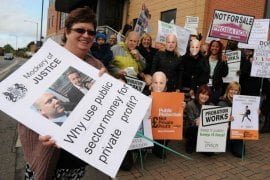With probation officers in England and Wales last week voting to strike over plans to privatise the probation service, we publish here an article by Steve Brown of the Northumberland UNISON, Police and Justice Service Group (personal capacity), written before the strike vote, which analyses the issues behind the strike.
With probation officers in England and Wales last week voting to strike over plans to privatise the probation service, we publish here an article by Steve Brown of the Northumberland UNISON, Police and Justice Service Group (personal capacity), written before the strike vote, which analyses the issues behind the strike.
The threatened privatisation of the probation system throughout the UK is a further attempt by the Tories and their friends in the City of London to dismantle public services and to generate profits for themselves.
The Tory-led Coalition want to hand over 70% of the probation service to private companies and charitable organisations and run it in the interest of company profits and not, as was the probation system’s original remit, on the basis of public safety. For those who may be unaware, the probation system was established not just to reinforce levels of corrective programmes but is also there primarily to manage risk in our communities.
Yes, it is an arm of the state machine but those who work within this key public service do so out of a sense of public protection and risk reduction and not just, as some might perceive, as a means to meet out punitive justice.
What this government is proposing is to farm out the lowest risk offenders (70% or 140,000 offenders) to these private companies while leaving the remaining 30% of high-risk offenders to be managed under the current, but much smaller, regime. However, and as many probation officers and probation service Officers will tell you, risk is a fluid question, changing constantly depending on circumstances.
Under the present publicly owned service this is fairly easy to manage as all the officers and staff occupy, in the main, the same buildings and use the same IT to communicate these risk factors. Bring in private providers, agencies and charities, all with their own IT, with their own structures and with their own ideas as to how the “risk” should be managed and handled, and you have chaos.
The plan to also introduce “payment by result” will mean also that the companies involved will be able to “cherry pick” the best and most able offenders who generate quicker payments and neglect the “harder to help” which can lead to a greater proclivity to reoffend. Again, another recipe for disaster!
The service has seen many, many cutbacks and rationalisations over the years and staff pay and opportunities have been subject to the same pressures as all other public services. For instance, all the buildings used by the probation service belong, in the main, to private landlords. All the IT and computer software belongs to private contractors. All the furniture and hardware belongs to private companies and suppliers and even the community payback staff have been privatised in many areas. So, the only aspect of probation left to sell off is the core Admin staff and probation officers themselves. On top of which, we all understand what happens when anything is privatised. Lower wages, worse conditions leading to poor morale, higher stress levels and ultimately, for probation and society at large, higher risks.
A reflection of the discontent within the workforce was demonstrated by a staff survey of UNISON members within probation. A resounding 99% of all those who took part have rejected the government proposals and a further 85% have agreed to the idea of forms of industrial action.
NAPO, the Probation Officers union, has yet to produce figures but they are conducting a campaign amongst their members on the basis that this is the final showdown. [Since writing, members of NAPO have voted for industrial action, with 80% voting YES.]
One success is the campaign to have the issue debated in parliament. They have also been assisted in their efforts to attack the proposals by the mess that G4S and SERCO have left in the wake of the tagging scandal.
Both companies have been found to have overcharged the Justice Department by up to £10 million. G4S has also refused to open its books, which has prompted calls for an enquiry into their operation. Everyone can now see clearly how these security companies operate. There are numerous stories going around of “cock-ups” and “fiascos”, in particular G4S’s disastrous handling of last year’s Olympic Games.
The solution to this problem remains the same as for all other public services or any workforce, whether public or private: militant action. All the unions involved in the justice system, including the Prison Officers Association (POA), need to be planning joint action to defend the service against privatisation, to fight for a programme to rid our public services of these profiteers and also to build upon the calls for general action.
The TUC must also back this up with the calling of a one-day general strike to focus the might of the whole movement and the working class against the attacks of the Tory-led Coalition government.
But in the final analysis, only a socialist programme can bring an end to all privatisations and threats to our livelihoods. The continuing battles within our public sector must lead all workers to the necessary conclusion that all this instability and crisis is the product of capitalism and it will only be through the active transformation of the labour movement into a fighting body, armed with socialist policies, that we can finally bring an end to this nightmare.






